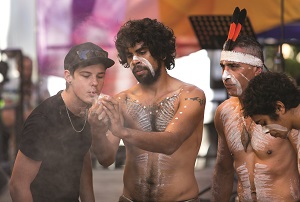12 September 2018

The University of South Australia is leading the way in creating tertiary education opportunities for Aboriginal peoples as it becomes the first university in the State to unveil a Stretch Reconciliation Action Plan (RAP).
With its initial RAP released in 2014, UniSA’s Stretch RAP – which was endorsed by Reconciliation Australia last week – goes further in its commitment to Aboriginal participation in education and employment.
UniSA Vice Chancellor Professor David Lloyd says reconciliation is a core UniSA commitment – a foundation touchstone that links back to the University’s founding act and antecedent institutions.
“The new the Stretch RAP will deepen our connection to Aboriginal culture and community and see new and targeted initiatives across our research, teaching and learning and organisational arrangements,” Prof Lloyd says.
“Our new plan is guided by Universities Australia’s Indigenous Strategy for 2017 to 2020 and will see much more ambitious targets around Aboriginal participation in education and employment within and across the University.”
The Stretch RAP – developed in consultation with Aboriginal Elders – has been collaboratively advanced by UniSA’s Pro-Vice Chancellor of Aboriginal Leadership and Strategy, Professor Irene Watson.
For Prof Watson, who was the first South Australian Aboriginal to graduate from a law degree some 30 years ago, there is optimism that this plan will create greater opportunities for Aboriginal peoples while embedding their culture into the University.
“The Stretch RAP will help to build a space in which there is greater visibility of Aboriginal peoples and our knowledges and cultures, while also creating a vibrant curriculum that continues to grow in its Aboriginal content,” Prof Watson says.
“It’s important that we create a culturally safe place where Aboriginal students can not only survive but thrive.
“Since I graduated from law in the 1980s, there has been a shift in Aboriginal participation in higher education and I’m hopeful that it will be an onward positive spiral.
“To achieve that, we need to ensure that Aboriginal peoples are able to engage in a higher education sector where there is a positive image of Aboriginal peoples and their future.
“The Stretch RAP works towards achieving this and creating the kind of university culture in which we can achieve those outcomes.”
The Stretch RAP is built on five themes of Place and Language; Aboriginal Knowledges, Culture and Engagement; Aboriginal Education; Aboriginal Research; and Aboriginal Governance, Evaluation and Reporting.
The Stretch RAP can be viewed online.
…………………………………………………………………………………………………………………………
Media contact: Michele Nardelli office (08) 8302 0966 mobile: 0418 823 673 email: Michele.Nardelli@unisa.edu.au



